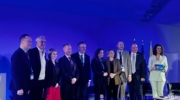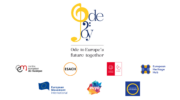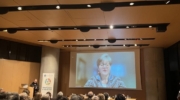Support for Ukraine, climate change, youth and New European Bauhaus discussed at European Heritage Alliance spring meeting
Members of the European Heritage Alliance convened online for their spring plenary meeting on 28 April 2022. The meeting gathered 24 Member Organisations and focused on key policy developments and the respective contributions by Alliance members, including cultural heritage and climate action, the European Year of Youth 2022 and the New European Bauhaus initiative. Special attention was also given to the war in Ukraine and the ways Alliance members have responded to support Ukrainian cultural professionals.
The Spring meeting of the #EuropeanHeritageAlliance is taking place today! Members are discussing current challenges in Europe:
🇺🇦 Support to Ukraine
🍃Heritage Movement for Climate Action Europe
💡 #NewEuropeanBauhaus
🗺️ #EuropeanYearOfYouth
🇪🇺 Projects & Initiatives by members pic.twitter.com/V00zeNFHqi— Europa Nostra (@europanostra) April 28, 2022
The meeting was chaired by Lilian Grootswagers, Advisory Board President of Future for Religious Heritage, who acted as the Alliance Rotating Chair for the second time. She welcomed the 24 organisations represented as well as the special guest, Alejandro Ramilo, Project Adviser and Coordinator at the European Education and Culture Executive Agency of the European Commission, while expressing gratitude to the Creative Europe Programme of the European Commission for the support given to activities related to the Alliance in the frame of Europa Nostra’s network project European Cultural Heritage Agora: “Empowering Europe’s Civil Society Movement for Heritage” (2022-2024).
The first item on the agenda was “Support to Ukraine” introduced by Lorena Aldana, European Policy Coordinator at Europa Nostra. Lorena Aldana applauded the impressive solidarity shown by the heritage community towards the Ukrainian cultural professionals and invited both individuals and organisations to contribute to the crowdfunding campaign run by Europa Nostra and Global Heritage Fund, which has raised over $50,000 and aims at doubling the amount.
Together with @GlobalHeritage Fund, we just launched a crowdfunding campaign to support the brave defenders of Ukraine’s endangered heritage.
We welcome donations, big or small, and thank you for your generosity & solidarity! #StandWithUkraine
🙌DONATE NOW:https://t.co/f6zj7Bjley pic.twitter.com/0m9KlalRhs— Europa Nostra (@europanostra) March 18, 2022
The Network of European Museum Organisations – NEMO detailed their action of gathering support initiatives organised by museums for Ukrainian colleagues and citizens. Other members of the Alliance, such as Europeana, ENCATC and the European Travel Commission also issued statements of support to the Ukrainian colleagues and citizens, while condemning the war.
The next topic on the agenda was the Heritage Movement for Climate Action in Europe and follow-up of the European Cultural Heritage Green Paper: “Putting Europe’s shared heritage at the heart of the European Green Deal”, to which many members of the Alliance contributed. During her introduction to the topic, Lorena Aldana mentioned the steps taken by Europa Nostra since the last Alliance meeting to widely promote this paper as a basis for joint advocacy efforts, including by presenting it in numerous events, such as the 26th UN Climate Change Conference of the Parties (COP26), the G20 webinar on climate change and culture, the UN-HABITAT webinar on rural-urban integration in combating climate change and the Reflection Group “Heritage and the EU” meeting. The Network of European Museum Organisations – NEMO, represented by Julia Pagel, presented their survey on climate action and museums, which had been launched on 22 April.
Another topic of discussion was the New European Bauhaus (NEB), of which many Alliance members are partners and are actively contributing to, including a.o. the Architects’ Council of Europe, Association des Centres Culturels de Rencontres, Eurocities, European Cultural Foundation, The European Fashion Heritage Association, ENCATC, FRH, IFLA Europe, Mad’in Europe, Michael Culture Association, Heritage Europe, ICOMOS and Trans Europe Halles. The New European Bauhaus was introduced by Manon Richard, EU Projects Officer at Europa Nostra, who emphasised that one of the key aspects of the initiative is the mainstreaming of its core values of sustainability, inclusiveness and beauty across policies and programmes, including Horizon Europe, Creative Europe and Erasmus+. She presented how the European Parliament, the European Economic and Social Committee as well as the European Committee of the Regions envisage the further development of the NEB in their recently issued policy documents. Another major development of the initiative is the New European Bauhaus Festival, which will take place on 9-12 June in Brussels and numerous other locations on the continent. The NEB Festival will comprise a Fair, a Fest and a Forum. During the exchange of views, Alliance members reported on their current and future plans of getting involved in the NEB. The Architects’ Council of Europe will organise an event during the NEB Festival, while Europa Nostra will host an event, also on behalf of the Alliance.
The last topic of the meeting was the European Year of Youth 2022, which was introduced by Miruna Găman, Trainee at Europa Nostra and ESACH. The main contributions from Europa Nostra to this European Year include the European Heritage Youth Ambassadors programme, developed with ESACH and the European Heritage Tribune, as well as the consultation “Youth for the Future of Cultural Heritage in Europe”, held with its partner organisations working with youth in cultural heritage. The consultation aims to map the main challenges, needs and dreams experienced by young people involved in cultural heritage.
🇪🇺 As a contribution to the #EuropeanYearOfYouth 2022, @europanostra, in partnership with heritage youth organisations, launches a wide consultation on #Youth4Heritage in Europe!
🗣️ Help us empower & raise the voice of Europe’s young generation 👉https://t.co/ozIc5pfAME pic.twitter.com/yQhlKQpG1a
— Europa Nostra (@europanostra) April 20, 2022
Future for Religious Heritage mentioned their initiative Run for Heritage 2022, in which young people were invited to exercise on a route linking cultural heritage sites of their choice.
During the open discussion that followed, Alliance members shared their latest updates, including on the CHARTER and Cultural Heritage in Action projects, and upcoming events, such as the Interpret Europe training course for UNESCO’s World Heritage Sites managers.
The Alliance members also agreed to fully endorse and support the joint statement published on 26 April 2022 by ICOMOS, ICOM, E.C.C.O – three longstanding members of the European Heritage Alliance – , as well as by ICOMOS-Corpus Vitrearum ISCCSG and ICOM-Glass regarding the European Chemicals Agency’s (ECHA) plan to include lead in the list of substances subject to authorisation (Appendix XIV of the REACH Regulation). This statement urges the ECHA and the European Commission to exclude the use of lead in the fabrication, conservation and restoration of stained glass and other cultural goods from its proposed ban. Europa Nostra, acting in its own capacity and also on behalf of the European Heritage Alliance, which is coordinated by Europa Nostra, replied accordingly to the ECHA official consultation and also sent its submission directly to Mariya Gabriel, European Commissioner for Innovation, Research, Culture, Education and Youth.
Next Steps
Alliance members agreed to organise their next plenary meeting in the Autumn. In the meantime, they will continue exchanging information and working together to take their joint efforts further and strengthen synergies with other important actors on the European cultural heritage scene.







